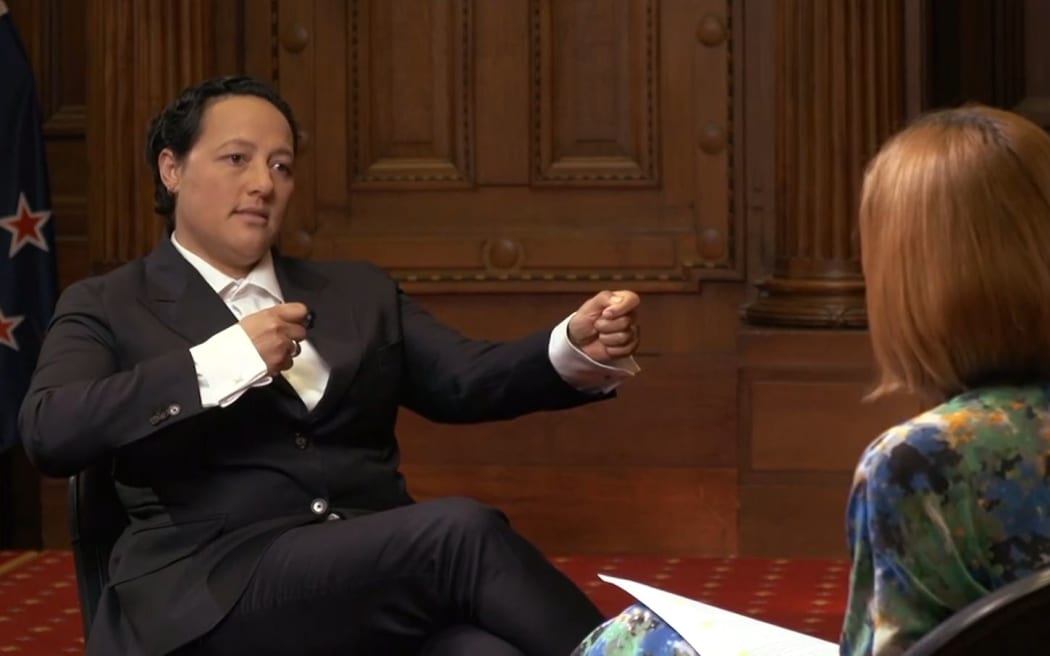The new justice minister has said name suppression in our courts “is not working” because it’s granted too often to people with the means to make a strong bid for it.
That puts Kiri Allan on the same page as the media, which wants greater freedom to report details of court cases of public interest. But would that also jeopardise the right to a fair trial?

New justice minister Kiritapu Allan made the most of her appearance on TVNZ’s Q+A show last weekend. Photo: screenshot / TVNZ
New justice minister Kiritapu Allan made the most of her appearance on TVNZ’s Q+A show last weekend.
She lined up an announcement about a law change to allow communities to have more say on the availability of alcohol for sale in their backyard, which would also neuter the liquor lobby’s power to appeal local sales policies.
Allan also told Q+A she would tweak other aspects of our justice system deemed to be falling short - and right at the end, she sprang another surprise when TVNZ political editor Jessica Mutch-McKay asked about controversial hate speech laws.
These had stalled under the previous minister responsible, Kris Faafoi, who simply stopped talking about the issue in his final months before he quit to become a lobbyist recently.
"I guarantee that I'll be introducing a law that I intend to have concluded and put into law by the next election," Allan told Mutch-McKay.
Mutch-McKay also put the minister on the spot about another area where the media has a vested interest.
“Do you think name suppression is working?” she asked.
“No I don't,” Allan replied.
"If you're well funded, well-resourced, then you can seek to have your name suppressed for a range of different reasons . . . and I don't think that leads to just outcomes," the minister said, adding that she’s seeking “urgent advice” on what to do.
We’ll see if urgent action follows the urgently requested advice, but that would have been music to the ears of many in the media who would love to be able to name more of the people who seek to keep their identity secret in court.
Name suppression can be sought by anyone but RNZ’s ‘Is this Justice?’ investigation last year found Māori were charged with 43 percent of crimes but only accounted for 17 percent of the interim and final name suppression granted.
Pākehā were charged with just over a third of crimes -- but accounted for two-thirds of interim and final name suppression.
Recently PR professional and former National Party president Michelle Boag went as far as the Supreme Court to try to keep her name out of reports of a high-profile trial.
Boag told the New Zealand Herald last week she had no regrets about how she handled the proceedings which have gone on for more than three years. The Herald also reported her bid for name suppression had cost her “close to $100,000.”
In his weekly media commentary Knightly Views, former Herald editor-in-chief Gavin Ellis applauded the minister’s comments and pointed out news media also spend a lot seeking to overturn name suppressions to be able to report trials fully in the public interest.
Both Stuff and the Herald’s publisher NZME went to court to name Michelle Boag.
Gavin Ellis said 700 people were granted suppression orders in Australia in 2018. In the year to June, almost twice as many were granted suppression here.
He said there was “no question” wealthy New Zealand businessman Ron Brierley would not be named after he was arrested and prosecuted in New South Wales for possessing of child pornography.
Section 200 of our Criminal Procedure Act sets out eight grounds on which a judge may grant name suppression to a defendant here.
It’s automatic in cases of sexual offending to protect the victims’ privacy - even if victims want to waive their rights.
But the most often-cited principle is the one that says “publication would be likely to cause extreme hardship to the person charged with, or convicted of, or acquitted of the offence, or any person connected with that person”.
Being well-known or well-connected should not by itself mean exposure of anyone’s identity will result in "extreme hardship."
Earlier this year, Auckland businessman Leo Molloy failed in his bid to have a conviction and sentence dismissed after admitting breaching suppression by naming Grace Millane’s killer.
But it seems good lawyers can often construct a case that judges find persuasive.
Last year in the midst of a Level 4 lockdown, an Auckland couple who travelled to their Wanaka holiday home engaged a QC to successfully seek interim name suppression before charges were even laid.
The occupation of the man’s mother, who turned out to be a judge, was also suppressed.
“Rather than grant interim suppression, courts should be emphasising the presumption of innocence until found guilty. In other words, a person’s reputation remains intact until there is good cause – a conviction – for it to be diminished,” Ellis suggested this week.
Even if it seems unfair those without the means to pursue name suppression don't have the same chance - is it any less fair for those who do, given the media’s appetite for such stories?
Boag had been due to appear as a Crown witness in that trial of a well-known businessman who was found guilty of sexual assault and perverting the course of justice - and received a prison sentence (but whose name is still suppressed because he has appealed the sentence).
But Boag was never called to give evidence and - via lawyers - had denied any involvement in the criminal conspiracy which eventually led to those convictions.
She insisted her reputation would be unjustly damaged by disclosure because her name had been misused by another PR professional caught up in the case - Jevan Goulter - who was not prosecuted because he supplied crucial evidence as a Crown witness.

Prof. Ursula Cheer, dean of the school of law at the University of Canterbury Photo: supplied
“I wouldn't be saying the system's not working. This is something that's brought up with me every year for the same reasons. Each time I still respond that I don't think it's broken,” University of Canterbury professor of law Ursula Cheer told Mediawatch.
“If the Minister is getting urgent advice I hope she's being referred to the Law Commission report on this matter before 2011, the last time this was looked at very closely,” said Prof Cheer.
“As a result of that, the Criminal Procedure Act was amended (to) the system we've got now . . . which is based on open justice. The accused person is entitled to a fair trial and that's a constitutional principle that's enshrined in the New Zealand Bill of Rights Act,” she said.
“Suppression operates as an exception to the open justice principle . . . and I believe that although occasionally a judge gets it wrong, the system is mostly working okay,” Prof Cheer said.
“The media when they report on suppression (are) completely self-interested and don't acknowledge their bias in this respect. I think the reporting about it is often extreme and exaggerated and often not backed up by numbers,” she said.
But isn’t it unjust, as the minister said last weekend, that there are several grounds which people who have good lawyers can deploy to make a persuasive case that the exposure of their name and identity will cause them disproportionate harm? Surely that privileges people with high status and reputations?
“Everybody is entitled to apply for suppression but they have to show they would suffer extreme hardship - not just undue, embarrassing effects. The argument about people with money doing better is a red herring in terms of suppression in my view,” Prof Cheer told Mediawatch.
“Almost everybody will get interim name suppression because they're entitled to it in the initial stages. That is because the law is intended to let them go home, talk to their families, let them know what's happened, put their affairs in order, and so on.
"The issue for them is when they come back into the system, and that's when they have to make any grounds to keep that suppression going,” she said.
“Suppression gives you freedom from being exposed in the media and freedom from public shame. And in some way that is seen as being another form of punishment that people should be put through.
“This is an ‘access to justice' issue and that problem has always been there and continues to be there. And if this government can fix that up, that would be a great thing. But there seems to be a view that getting suppression somehow changes the outcome to your trial and . . . that is not correct,” she said.
“If the baby is chucked out with the bathwater, and suppression orders are somehow reduced or eliminated, there would be huge issues around fair trials. In the US, juries have to be sequestered and the longer a trial is, the longer they have to be put up in a hotel, isolated from any access to technology and so on.
"You still (have to) make sure fair trial rights are protected. Otherwise, the basic need for the justice system to try crime on our behalf would be completely destroyed,” Prof Cheer told Mediawatch.
“It's interesting that the government's very interested in sorting out hate speech, but happy for name suppression to come off to subject people to hate speech, even though they haven't been found guilty of an offence at that stage,” she added.


